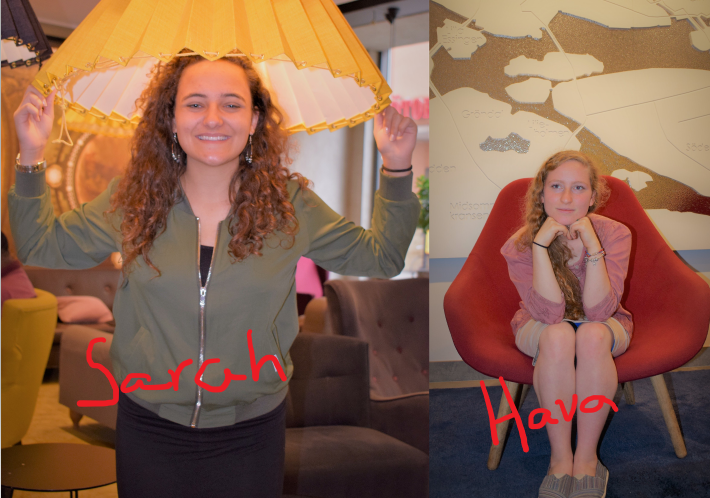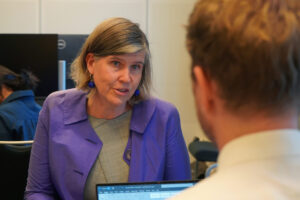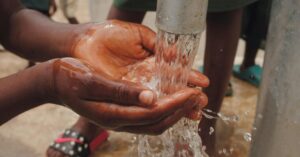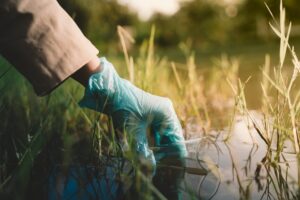Hava Herman and Sarah Borni from Israel
Who is normal and ordinary Sarah and normal and ordinary Hava?
Sarah: I was born in France and I immigrated to Israel when I was two years old. I have one brother one sister. I like to dance. I volunteered for two years in a hospital with kids and… that’s it.
But you speak French as well?
Sarah: Yes.
So English, French and Hebrew
Hava: I was born in Israel. I’ve lived in the States for sometime. My father is a historian, we all moved with him for a year while he was at Cornell University. I got the american accent. At home we speak English and outside is Hebrew.
So your mom speaks English?
Hava: Israel is a country of immigrants. My mother came to Israel from the US. My father’s from Britain. So English is the language at home. And language is a present. Of course they wanted to give that to us.
Ever since I was little I really love just getting interested in different topics, researching them and understand them better.
You described yourself as a continual learner (in her WaterTank biography)?
Hava: I really enjoyed learning process. Most people use the summer time to go to the beach and stuff but instead I was always taking courses and learned so many different skills. Everything from microbiology to sailing. Doors open to when you’ve when you try to put your time into studying something. I also volunteered. I was a counsellor in a youth group. I worked with kids who came from quite difficult backgrounds. I was also a mentor for the FLL competition in my school.
FLL is an International Robotics and invention competition and the topic this year was water. I was a mentor in a water competition. I instructed the kids about the building of the robots and they had all these things I did with them. So in biotechnology we were learning about microchips that were able to detect DNA. The idea that we’re trying to put together in our FLL team was to try to use this (microchip) for detecting bacteria in water. It’s a continuous experience.
How did you hear about SJWP?
S & H: by accident
Aren’t accidents great? Serendipity for the wind!
Sarah: It’s like okay, so after we went to the competition in Israel and we really didn’t realise that we won.
Hava: Yes it’s like everyone wins by accident. It could go another way.
Sarah: And maybe tomorrow we will know how it goes here in Stockholm (“Tomorrow” was the day of the SJWP award ceremony).
How do you feel about the interview so far? Are they what you expected?
Sarah: The judges are really sweet and very reassuring.
Hava: I think it’s really important that they are. Like for us, we wrote our project in Hebrew and all the terms and everything. It’s all in Hebrew. We’re not in our most comfortable zone and yet they make us feel so…
Sarah: Comfortable.
Hava: Yes, and patient with everything.
Sarah: Our major is biotechnology and one day after we learned about genetics and microorganism and bacteria, the teacher comes and says that you need to find a question for your project.
Hava: We decided we were not going to work on something for two years that we weren’t interested. That was our main motivation.
Israel is a country that’s suffering from drought, there are a lot of droughts in Israel. And we’re continuously searching for the creation of new water sources. Waste water is definitely the most both productive and promising form of doing that, but there’s hardly any biological testing in the wastewater treatment process. We went through the plant and it was all chemical. There was only one biological test, that took them about five days to do and there’s really nothing that has to even do with biology. Our results showed there is really a need for biological testing and detoxify testing. We really want to make sure that the effluent that we need to use. We need this effluent, but we need to make sure that it is safe as well.
What was the biggest challenge you face in your project?
Hava: Trying to punch in the scheduling system at the laboratories.
Sarah: Yeah, but also our exams.
Hava: The whole translation of our project, right, we’ve written an 80 page paper in Hebrew. We have it done, we’ve sent it in now. Now we need to translate it for the competition. And shorten it.
In Israel There’s something called “Bagrut” its state exams for everyone and there’s a time and there’s a place for them and there is no ability to move them.
Sarah: Yes. It was very difficult to make all the things come together.
Any scary moments?
Hava: Nearly falling into the wastewater maybe. You are walking on these things that are moving and you don’t know whether you’re about to have a wastewater bath.
And there is no oxygen in there, so you would just sink, you can’t float, just slowly sink. Oh my god.
Did you have maybe a mentor or teacher…
H & S: YES!
…that has been specifically valuable?
Sarah: Our technology teacher. She’s taught us everything we know and let us do the entire experience.
Hava: She’s a role model for us. That’s number one. But when it comes to the project, I think what she really did was she allowed us to learn individually and on our own.
Sarah: She dosen’t correct our project. She just sees, she explains we need to correct our project, we need to see the project, and to correct it by ourselves.
Hava: And I think that’s what really allowed us to become independent? In the laboratory and writing our project, even the English version. We wrote it completely on our own. And it was all based on what we’ve learnt.
She taught us we need to ask ourselves one question all over the project.
It’s like, so okay, these are results – but why? So, poisonous chemicals affect it – but why? You know you’re right – but why?
In addition, such a moral role model for us. I mean everything always has to begin and end with moral. We learned from her about genetical engineering, which has so many moral problems. Or the whole development of new medicines and everything. Everything has to begin with moral, we want to help people, we want to make the world a better place and it has to end with moral. It can’t end with money, it can’t end with pride. Everything has to be for the good of others and for the good of the world.
So in general, the projects, we went through a little bit of the fears and challenges…
Like falling in the pool!
S & H: Haha
Has there been any really great moments?
Sarah: When we discovered our results. Like “It’s genotoxic, yay!, its genotoxic!
Hava: (very ironic) We discovered a problem! yay!
Sarah: Yes! We were so surprised. NO but it was a little bit difficult to write the project because we all have different ways of thinking.
Hava: We also have different ways of thinking which is challenging but enriches the project.
S: Yes. It’s an advantage for this project too.
H: Temperation (as in having a temperament) is always hard.
S: But it was good, we are friends so this project was maturing.
H: we are not partners, we are friends.
How did it feel when you realised you won the national competition?
Sarah: I cried.
Hava: She cried.
Sarah: It’s very exciting you know, you will represent your country.
Hava: You really want to honor Israel, here, it’s Israel’s 70th year of Independence. So we want to make sure that we’re doing it correctly and that Israel is seen as an innovative and scientific country here. We hope we are doing it well.
You are leaders, you’re already inspiring. So in terms of the competition. You had an idea, developed a project and now you’re in Stockholm. A lot of things happened between here. How do you guys think this competition has like impacted or changed you?
Hava: So I was going to say that I really feel it opened my eyes to the world problems rather than just focusing on Israel. Maybe… Until now I felt responsible to my country. Now, I feel responsible to my world. Right? Because I’m being introduced to so many people and countries that I would never ever come in contact with if it weren’t for this competition. And it makes you feel… it makes you responsible and it makes you understand that problems are worldwide.
Have you learned anything about yourselves, personally, through the process?
Sarah: I learned that I can, if I have a goal, I can go until I succeed.
Hava: We have had a lot of set backs and we continued everything to get to where we are.
To realize that at your age, that if I just set that goal and continue with persistence and diligence, that it is attainable.
Sarah: Yeah, and in addition it opened my eyes to not only water problems but also politics. You know with Iran, now, it’s the water. And, France. And, Cape town.
Hava: But on the politic side, Israel offers help sometimes yes.
Sarah: Yes, for Iran, this year.
Hava: And also to Cape Town.
I know you both also very religious.
Hava: Yes, Orthodox.
How would you say that your faith guides your relationship to the world and water?
Hava: We believe. Ops, I will speak in my name, sorry. So there is a part in the very beginning of the Bible, it says God created an imperfect World. Why? Because he believes that we need to correct it. We need to make the world a better place. That’s our object in the world. otherwise there is no point in living. And you really think that water is one of the things that we really need to correct and make better, but just like everything in the world. We have responsibility towards everything. To do it ourselves. Because there are imperfections in the world. La’asot – to do, to create, to perfect.
Sarah: I’m very tolerant. So tolerance for me is, we are all equal. For me, water is, I don’t think water is something religious. It’s basic for life.
Hava: In Judaism, water is also considered life.
Sarah: Yes. But for the world, we are all humans and if I can help my friends, my brother, my sisters, you know, humans, even though they are not religious or they are not jewish, I will do it because we’re in the same world. I think that I got this perspective from my grandfather. My grandfather is catholic, all my family is like Half Jewish, half not, so I got it from this. To be tolerant. It’s very important.
Hava: In religion, and what we’ve noticed here in explaining every single thing, about the Sabbath, about praying, about everything, is that it makes us notice very small things that happen in life. We swear them. Everything has an explanation, every single little thing that we do. So I think if we we notice much more about the different aspects of life.
Hava: I think Judaism really, this is something that many people have, but Judaism really tries to make people feel responsible for what goes on around them. Also in a social sense, there’s so many rules that have to do with how to treat another person, how to be understanding, how to be thoughtful and kind, and all these things. All these things really make you feel that if I Don’t do it, then who will? who’s going to help? who’s going to correct things? Who’s going to make the world a better place? if not us.
Hypothetically speaking, if you could telepathically communicate every single person in the whole world under 35? What would you want to come across?
Sarah: I can do it now, with all the countries and SJWP finalists that are here, we can talk. I want to see the world and ask them how they see humanity.
Hava: I think kindness. I think kindness is the key. If people are kind to one another we would solve wars, it wouldn’t laud them to help one another, just be kind to one another.
Sarah: To listen to each other. In Israel, sometimes people think that we are religious, so we cant’ talk together. Because I have my world, you have your world, so we cannot have the same topics to talk about, but I think that’s it’s not correct. I think that we have all in the world have something in common.
There is no problem to talk with a person that have older thinking or something like that. Okay, I bring my perspective of the world and you give yours, and okay, maybe something from your perspective I will take it with me and you know it’s change. We change something and I think that the world needs to be like this. You know, share.
Interviewees: Hava Herman and Sarah Borni
Interviewer: Edward Veem
Team: Israel
Photographer: Lila Roumeliotou




